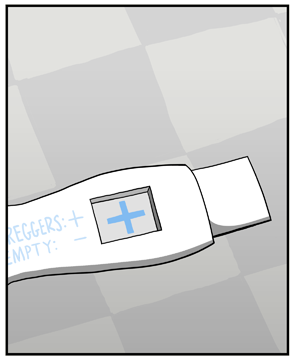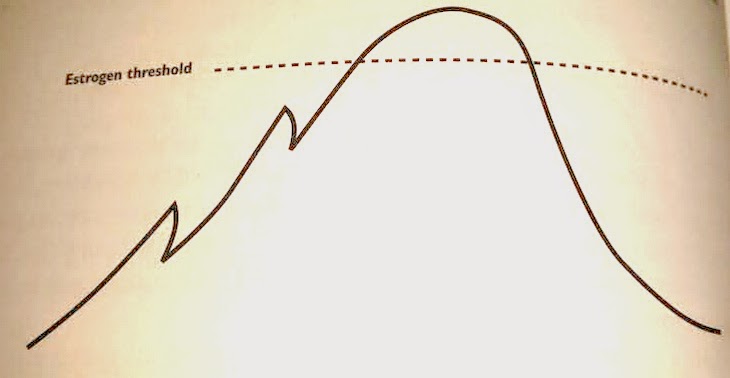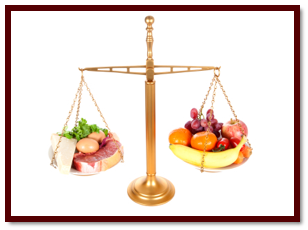
Mother Nature is a hypocritical sod. Check this out: The raison d’etre of your existence is reproduction. So why then, does good ol’ Mother Nature muzzle our fertility while we’re lactating? And is there anything we can do to get pregnant without pulling the plug on breastfeeding? In this post I will answer both questions in turn. What gives me the confidence to speak about this issue? Firstly, I’ve been there (conceived under 6 month postpartum whilst exclusively breastfeeding), secondly, I’ve conducted a shed-load of academic research into breastfeeding fertility.
A word of warning before we begin: As a result of reading this, you may find yourself up the duff, toot sweet. Want closely-spaced siblings? Dream of tandem-feeding? Read on!
Aunt Flo takes a vacation
While breastfeeding a lot of mothers notice that ‘shark week’ no longer occurs every month. Yet, as with many physiological happenings that appear idiotic, Mother Nature has a plan. You see, every time you bring your baby to your breast, you are sending your body an important message: “I have my hands full here, this baby needs me!” Because breastfeeding is such an intensive energy-draining practice, your body halts the baby production line so that you can focus your energies on the little cherub you’ve just popped out. Aunt Flo (your menstrual cycle) goes AWOL.
Whilst this is frustrating for the broody mom wishing to get knocked up, it is legit in evolutionary terms, it makes sense. Our bodies evolved in circumstances where moms were carrying their babies 24/7 (we lived in herds and never settled in one spot for too long), where foraging for food and catching prey required significant physical exertion, where babies would suckle every 15 minutes, and where we relied on our own body heat to keep us warm. We modern moms like to whinge that we’ve got it tough, that we’re soooooo busy with multitasking overload, but we don’t know SHIT compared to our prehistoric sisters.
Mother Nature knew that if babies were ever going to survive longer than their shrivelled cord stump, Mom couldn’t be getting pregnant anytime soon. If she did, she would be too knackered to do all that maternal stuff. And so, by the wonders of natural selection, we inherited an epidemiological quirk: our fertility pauses during lactation, a phenomena known as, yup: ‘lactational amerrhoea’ (took me several days to learn to pronounce that shit, and I still say it like ‘men’s diarrhoea’).
Interesting, but can I successfully breastfeed *and* get pregnant?
Yes, you can!
Okay, how?
Practically every lay article ever written on breastfeeding fertility has offered the following solutions to the ‘get pregnant whilst breastfeeding’ conundrum: 1. Give your baby a pacifier. 2. Space feedings. 3. Stop night-nursing. 4. Introduce solid foods. 5. Failing all that, wean baby from the breast.
Each of these suggestions is a simplistic anti-breastfeeding knee-jerk scraping of the barrel. They all involve reducing breastfeeds in an attempt to kick-start ovulation. Recall that breastfeeding sends your body the message: “I’ve got my hands full looking after this baby”. The above solutions aim to send the contrary message: “My baby doesn’t need me that much”, or even: “my baby is dead”.
Each solution has varying degrees of success – good for your fertility, not so good for your baby. Folks who offer the above solutions have clearly not read all of the fertility research. We can’t blame them. Most of the research into breastfeeding and fertility focuses on developing countries because fertility is a huge issue to those folks. In countries where survival means strenuous daily physical activity and poor nutrition, postpartum fertility can mean the difference between life (mom doesn’t get pregnant and so can sustain her infant), or death (mom gets pregnant and infant #1 perishes).
However, if you dig around the vaults of epidemiological fertility research (and here’s where being a PhD student has slapped me on the back and bought me a pint), you can discover the dichotomy between lactational amerrhoea in developing countries and lactational amerrhoea in prosperous Western countries.
In essence:
The key to getting pregnant is sending your body a new message: “I’ve got my hands full…BUT it’s still safe to get pregnant right now”. How can you do this? Forget Fertility Friend, your new BFF may just be your local grocery store…
Introducing the ‘Relative Metabolic Load Hypothesis’
Despite its fancy label, this theory is straight forward. Ever since scientists learnt how to precisely measure reproductive hormone levels in saliva and urine, a new body of evidence opened up: the relationship between maternal nutrition and fecundity; or in other words: what you eat while breastfeeding affects your fertility status. Woah, goosebumps! Exciting, no?
This hypothesis suggests that ‘shocking’ your body through nutrition can kick-start fertility. In one study (Lunn et al 1984), a substantial increase in food consumption during lactation had negligible effects on milk production and milk quality but – and here’s the magic – it hastened the return of menstrual cycling, and shortened the interval to next conception! Yup, turns out the female reproductive system is highly sensitive to metabolic energy availability. It’s the same kind of process as seen in anorexia, only in breastfeeding, the mechanism is way more sensitive (Rosetta and Taylor 2009).
What you eat during lactation has an important effect on fertility – an effect independent of nursing frequency (Frisch, 1978; John et al., 1987). Consider this curious fact: Moms that nurse with high frequency get pregnant just as fast as moms who nurse much less frequently… providing they meet the threshold of ‘well-nourished’ (Worthman et al 1993; Valeggia and Ellison 2004; Ellison 2001; Lipson and Ellison 1996). Let’s just soak that up for a moment: Stuffing your face while breastfeeding can increase your fertility. I’ll say it again: Eating more food can increase your chances of conception.
OMG! So how does it work?
The studies show that resumption of menstrual cycling is closely coordinated with changing insulin levels, and whaddya know: insulin is a pretty badass stimulator of ovarian estrogen production (Willis et al 2001). Insulin reflects changes in metabolic energy balance (Valeggia and Ellison 2009), it’s a signal to your body that food is available.
So, if you want to increase your chances of getting pregnant while breastfeeding do what scientists refer to as ‘creating favourable energetic conditions’. A sudden burst of energy-dense food consumption can trigger the following cascade: Firstly, mom experiences a brief period of insulin resistance above her average levels, and then, usually a few weeks later, her ovarian cycling resumes. Within this time period, she may notice that her body begins to produce fertile quality cervical fluid (gunky eggwhite vaginal discharge) as her hormone levels pass over that all-important estrogen-threshold. To illustrate, take a gander at the diagram below (taken from the wonderful Weschler 2003). It shows your hormone levels as your body repeatedly attempts to ovulate, and then succeeds:

In other words: Sudden gorging can increase your chances of getting pregnant because it raises your insulin levels higher than your body is used to. Elevated insulin then stimulates ovarian steroid production, causing estrogen levels to rise. (Science, I could hump your leg right now!) Rising estrogen stimulates your fat cells to bring the insulin levels back into the normal range. This whole process serves to jump-start ovarian function as maternal energy availability rises above the demands of milk production. It’s all about reassuring your body that it’s safe to breed. No need to reduce breastfeeds.
This amazing process – your body’s intuition – is a pattern that we humans share with both chimpanzees and orang-utans (Ellison 2001; Emery Thompson 2005). Energy dense foods are cues we can use to satisfy our body’s drive to synchronise reproductive success with energy availability. But before you get all health-police on my butt, I’m not suggesting you should start auditioning for ‘Fat: The Fight Of My Life’ or anything like that. Rather, I’m suggesting that increasing your energy intake is a temporary strategy with the purpose of reassuring your body that food reserves are plentiful. You can always opt for those energy dense foods that come in healthier guises (nuts and honey are stellar examples), but dayuuuum, just look at that cake!
In a nutshell…
You CAN (quite literally) have your cake and eat it. It is possible to nurse all hours under the sun and still conceive. The duration of lactational amenorrhea is inter-related with the relative metabolic load of lactation: fertility will stall if the body experiences lactation as a heavy burden. So, whilst infant feeding behaviour determines absolute metabolic load, maternal nutrition impacts upon relative load. Tonight, we feast!
Good luck, and enjoy the BFP!

















